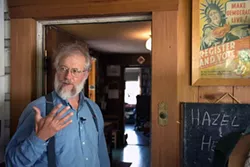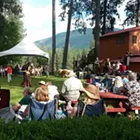John Elwood lives in a town that no longer exists. Where churches, hotels and homes once lined the streets, now remain the few forlorn fragments of an Eastern Washington ghost town: an old cemetery; a boarded-up brick church; an unused railroad trestle straddling the banks of the Palouse River.
Elberton, Wash., is a place where the pavement ends and the past begins.
“Rather few people really get the opportunity to live in a rural setting in the Palouse country,” says Elwood, 62, who lives in a century-old home with his wife, a cat named Tom Kitten, and two dogs, Barkis and Pip.
Elberton, 60 miles south of Spokane, is one of only two Washington towns in the past 50 years to disincorporate, or give up its official status as a town. Two others, Gold Bar and Mesa, have recently mulled disincorporation due to budget issues.
Although Elberton is now a quiet residential community of less than 15 people, it was once, as Elwood puts it, an “up-and-comer.”
The town got its start in the 1870s, and succeeding decades brought rail service and growth. With a population of 500 at the turn of the 20th century, Elberton enjoyed an economic boom spurred by a sawmill, a flour mill, acres of prune orchards and a four-furnace fruit dryer said to be — at one time — the largest in the world.
The town also hosted the famed Elberton Picnic — a three-day, fair-like event so big that former presidential candidate William Jennings Bryan once attended to give a speech.
After a while, though, hard times befell Elberton.
Decline and Demise
The demise began when the local sawmill moved to Idaho after exhausting local timber resources. A fire in 1908 and flood in 1910 destroyed portions of the town. Eventually, Elberton’s flour mill closed, and prompted by improving transportation to larger towns, so did the rest of its once-thriving business district.
Largely residential in the following decades, Elberton’s population shrank to less than 70 by 1966. That year, after a series of bridge repairs exceeded the town’s operating budget, the town disincorporated.
When a town disincorporates, the majority of its assets and powers are transferred to either the county or state. In Elberton’s case, a 1969 grant allowed Whitman County’s parks and recreation department to take ownership of most of the former town’s land. The county envisioned turning the site into a county park that doubled as a living history museum, but a lack of finances sidelined those plans.
Today, a few residents and a ropes course, operated and maintained annually by the Palouse River Counseling Center, are the only active portions of Elberton.
“It’s just sad that the little town had to die,” says Bill Stern, 66, who grew up on his father’s farm just outside Elberton’s city limits.
Stern recalls a childhood spent playing games in front of an old general store that’s now a bare foundation with a derelict basketball hoop. Children would swim in the Palouse River during the summer and ice skate on it during the winter.
Charlotte Mundell, 71, was raised in Elberton and remembers Sunday school classes at the still-standing United Brethren Church, built in 1913. The classes were held in the basement, which filled with mud after a 1996 flood.
Little House on the Palouse
And then there’s Elwood, who has watched over the site as Elberton’s “mayor” since moving there in 1982 from outside of Colfax.
The faux title was given to him years ago by D.A. Davidson, Elberton’s last official mayor who ran Elberton’s final business — a general store — until the mid-1970s.
Stepping into Elwood’s home is like stepping back in time. There are no computers or televisions. In the kitchen sits a cast-iron stove. On a nearby wall hangs a gray rotary phone. Hanging near the front door, on an enclosed porch, is a framed 1944 voting poster. Elwood found it in an old shed on his property. The house, he says, once was Elberton’s polling place.
Elwood’s doorbell, repaired using a bell from a tricycle, is indicative of the remodeled and somewhat cannibalized nature of his home: various parts and pieces — including a brown-and-gray, paint-cracked backyard door taken from a painter’s former residence — were removed from other unoccupied area homes.
In the backyard — not far from where Elberton’s picnic grounds once featured a dance pavilion, grandstand and horse-racing track — are several sheds, wooden swings, two gardens and a chicken pen.
During the summer, Elwood and his wife sleep outside in a wooden pavilion situated near a sheepherders’ wagon that’s now a sauna.
Although the Elwoods originally paid rent to the county to live in their home, the rest of Elberton’s rental homes were eventually abandoned or burned as training exercises for local firefighters. Today, the couple is only responsible for the house’s upkeep.
“It’s only here because we saved it,” says Elwood with a laugh. “And when we’re done with it, my guess is that [the county] will be, too.”
Until that time, however, Elwood likely will be content as Elberton’s “mayor,” keeping tabs on the old church, admiring the land’s natural beauty, and telling anyone who’ll listen about this nearly forgotten part of the Palouse.
This article was provided by Murrow News Service, which is produced by journalism students at the Edward R. Murrow College of Communication at Washington State University.

















